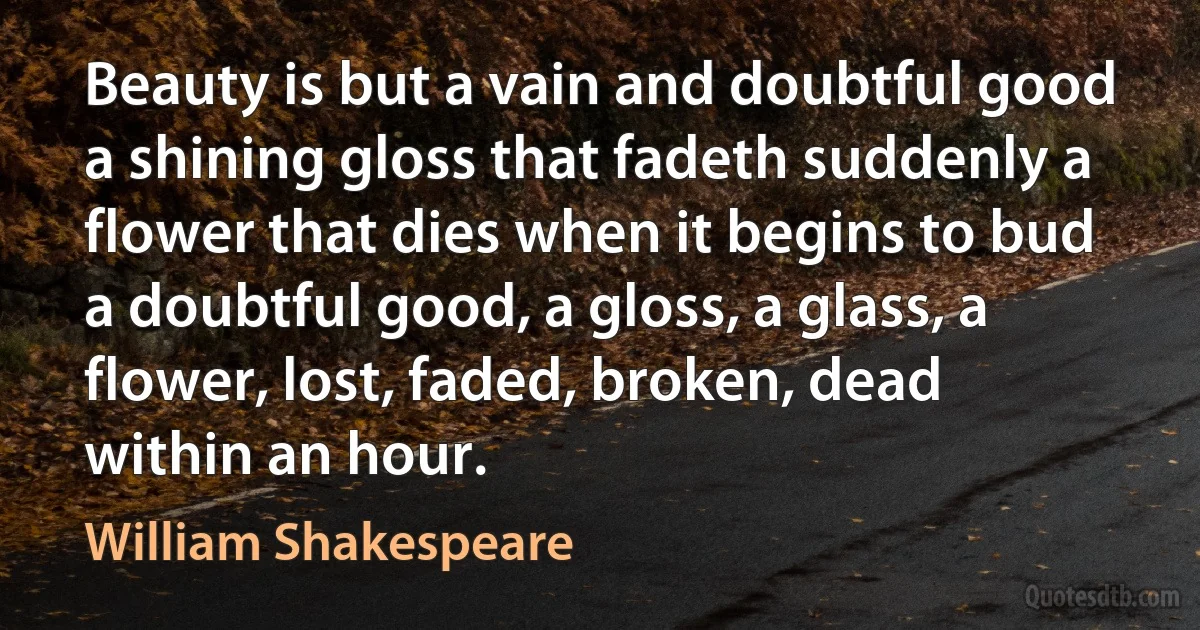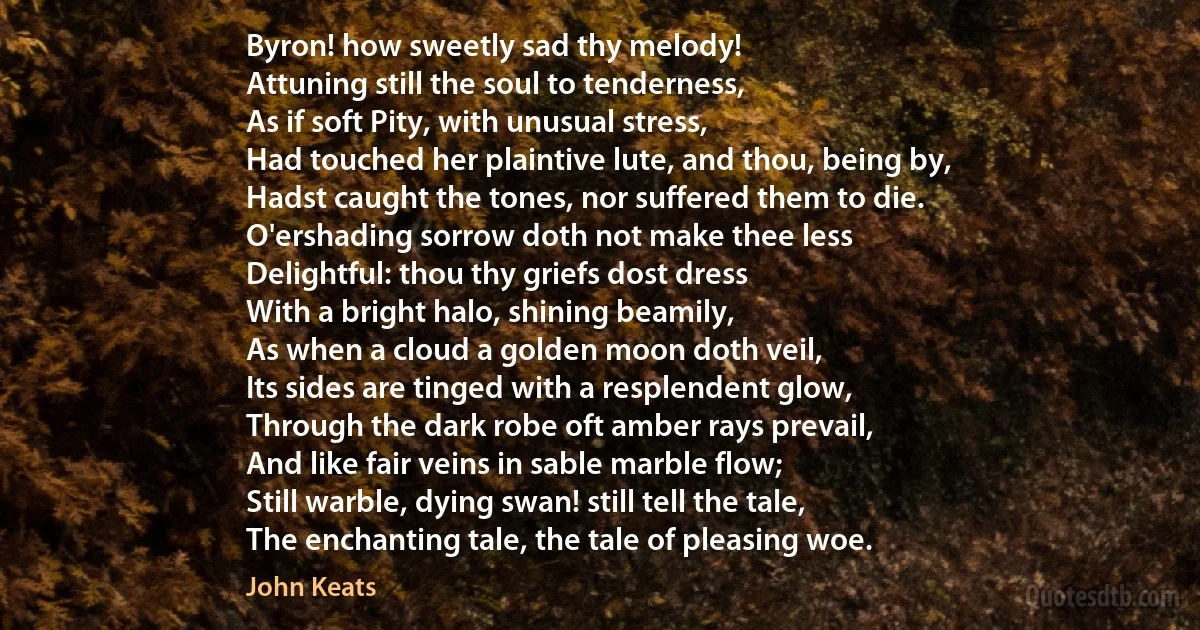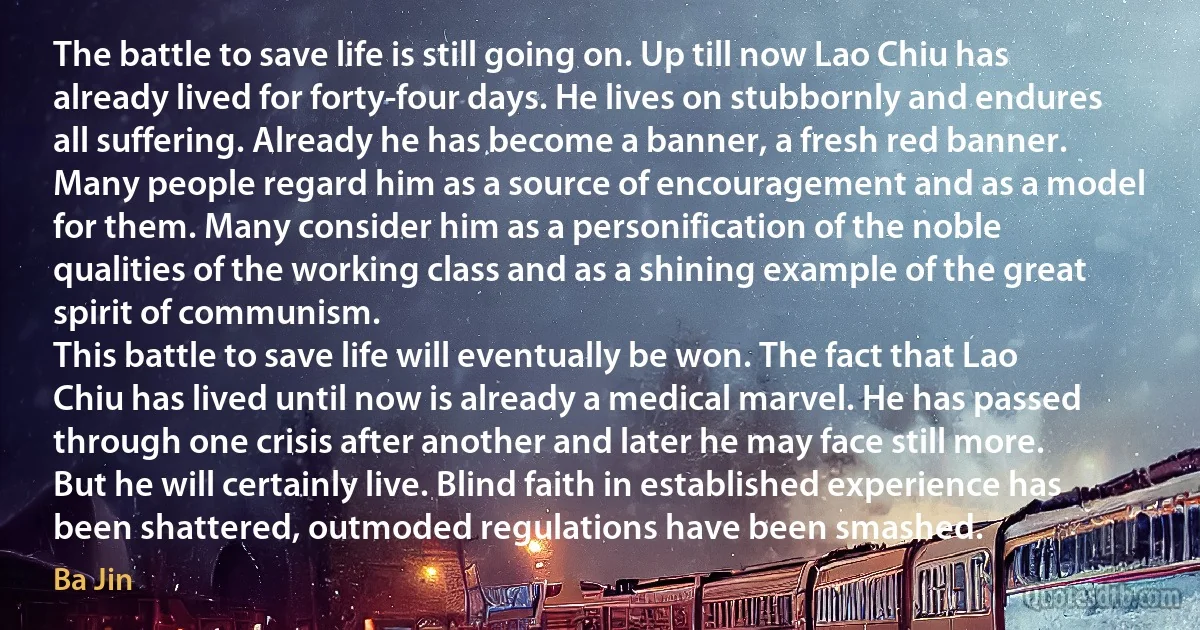Shining Quotes - page 18
I know the title of a King is a glorious title, but assure yourself that the shining glory of princely authority hath not so dazzled the eyes of our understanding, but that we well know and remember that we also are to yield an account of our actions before the great judge. To be a king and wear a crown is a thing more glorious to them that see it than it is pleasant to them that bear it.

Elizabeth I of England
When Dawn strides out to wake a dewy farm
Across green fields and yellow hills of hay
The little twittering birds laugh in his way
And poise triumphant on his shining arm.
He bears a sword of flame but not to harm
The wakened life that feels his quickening sway
And barnyard voices shrilling "It is day!"

Joyce Kilmer
Do not mourn the past, my brother; it has given place to better times. Do not dread the coming of the future; it shall dawn in brighter and safer glory. Come, and upon the altars of the faith be anointed as the Daniels of to-day, at once the prophet and the worker - the brow bright with the shining prophecy, the hands full of earnest and of holy deeds.

William Morley Punshon
This process of self-discovery is scientific and the invariable rule of science has to be applied - experiment and observe. The experiment is to ask the question; the observation is to look at yourself and see what happens. Being a science the law cannot vary. Any apparent variation is in you: you will have stepped off the way of facts into conclusions. The sun is either shining or it is not. You do not have to conclude; you just look.

Barry Long
"Is it agreeable?" somebody asked.
"Neither agreeable nor disagreeable," I answered. "it just is." Istigkeit - wasn't that the word Meister Eckhart liked to use? "Is-ness." The Being of Platonic philosophy - except that Plato seems to have made the enormous, the grotesque mistake of separating Being from becoming and identifying it with the mathematical abstraction of the Idea. He could never, poor fellow, have seen a bunch of flowers shining with their own inner light and all but quivering under the pressure of the significance with which they were charged; could never have perceived that what rose and iris and carnation so intensely signified was nothing more, and nothing less, than what they were - a transience that was yet eternal life, a perpetual perishing that was at the same time pure Being, a bundle of minute, unique particulars in which, by some unspeakable and yet self-evident paradox, was to be seen the divine source of all existence.

Aldous Huxley
There is in them a softer fire than the ruby, there is the brilliant purple of the amethyst, and the sea green of the emerald - all shining together in incredible union. Some by their splendor rival the colors of the painters, others the flame of burning sulphur or of fire quickened by oil.

Pliny the Elder
Commerce has set the mark of selfishness, the signet of its all-enslaving power, upon a shining ore, and called it gold before whose image bow the vulgar great, the vainly rich, the miserable proud, the mob of peasants, nobles, priests, and kings, and with blind feelings reverence the power that grinds them to the dust of misery.

Percy Bysshe Shelley
Jesus Christ, nailed to the Cross [in his painting 'Cross in the Mountains (Tetschen Altar)',] is turned to the setting sun, here the image of the totally enlivening Father. With Christ dies the wisdom of the old world, the time when God the Father wandered directly on Earth. This sun set and the world was no longer able to apprehend the departed light. The evening glow shining from the pure noble metal of the golden crucified Christ is reflected in gentle glow to the earth. The Cross stands raised on a rock, unshakably firm, as our faith in Jesus Christ. Around the Cross stand the evergreens, enduring through all seasons, as does the belief of Man in Him, the crucified.

Caspar David Friedrich
Is a Sufi a follower of Islam? The word Islam means 'peace'; this is the Arabic word. The Hebrew word is Salem (Jeru-salem). Peace and its attainment in all directions is the goal of the world.
But if the following of Islam is understood to mean the obligatory adherence to a certain rite; if being a Muslim means conforming to certain restrictions, how can the Sufi be placed in that category, seeing that the Sufi is beyond all limitations of this kind? So, far from not accepting the Quran, the Sufi recognizes scriptures which others disregard. But the Sufi does not follow any special book. The shining ones, such as 'Attar, Shams-i Tabriz, Rumi, Sadi, and Hafiz, have expressed their free thought with a complete liberty of language. To a Sufi, revelation is the inherent property of every soul. There is an unceasing flow of the divine stream, which has neither beginning nor end.

Inayat Khan
The Swiss-born psychiatrist Elisabeth Kubler-Ross changed western cultural resistance to dealing with death, and the teaching of how to accept it... Kubler-Ross's best known contribution to the study, thanatology, that she had helped to create, was the five stages of dying people go through. She described them - denial, anger, bargaining, depression and acceptance - in her bestseller On Death And Dying (1969), written in two months. Not everyone experiences all five, she cautioned, but at least two are always present. The definition, reached after scores of interviews with people facing imminent death, helped the medical profession to deal with a factor it had long refused to acknowledge, especially in the US... She wrote more than 20 books.. A firm believer in a god and the life hereafter, she became fascinated with near-death experiences and an advocate for people's stories of seeing a shining light and familiar faces, before being brought back from the brink.

Elisabeth Kübler-Ross
I want to recognize all of you who are here in this audience. We have our educators, our leaders, our young people who have been with us since we launched Reach Higher back in 2014. Now, when we first came up with this idea, we had one clear goal in mind: We wanted to make higher education cool. We wanted to change the conversation around what it means and what it takes to be a success in this country. Because let's be honest, if we're always shining the spotlight on professional athletes or recording artists or Hollywood celebrities, if those are the only achievements we celebrate, then why would we ever think kids would see college as a priority?

Michelle Obama
But there's this one thing I wanted to say... I'm so ashamed of myself... When Jack quoted something, it was usually classical... no, don't protect me now... I kept saying to Bobby, I've got to talk to somebody, I've got to see somebody, I want to say this one thing, it's been almost an obsession with me, all I keep thinking of is this line from a musical comedy, it's been an obsession with me... At night before we'd go to sleep... we had an old Victrola. Jack liked to play some records. His back hurt, the floor was so cold. I'd get out of bed at night and play it for him, when it was so cold getting out of bed... on a Victrola ten years old - and the song he loved most came at the very end of this record, the last side of Camelot, sad Camelot... "Don't let it be forgot, that once there was a spot, for one brief shining moment that was known as Camelot."...There'll never be another Camelot again...

Jacqueline Kennedy Onassis
Others taunt me with having knelt at well-curbs
Always wrong to the light, so never seeing
Deeper down in the well than where the water
Gives me back in a shining surface picture
My myself in the summer heaven, godlike
Looking out of a wreath of fern and cloud puffs.
Once, when trying with chin against a well-curb,
I discerned, as I thought, beyond the picture,
Through the picture, a something white, uncertain,
Something more of the depths – and then I lost it.
Water came to rebuke the too clear water.
One drop fell from a fern, and lo, a ripple
Shook whatever it was lay there at bottom,
Blurred it, blotted it out. What was that whiteness?
Truth? A pebble of quartz? For once, then, something.

Robert Frost



